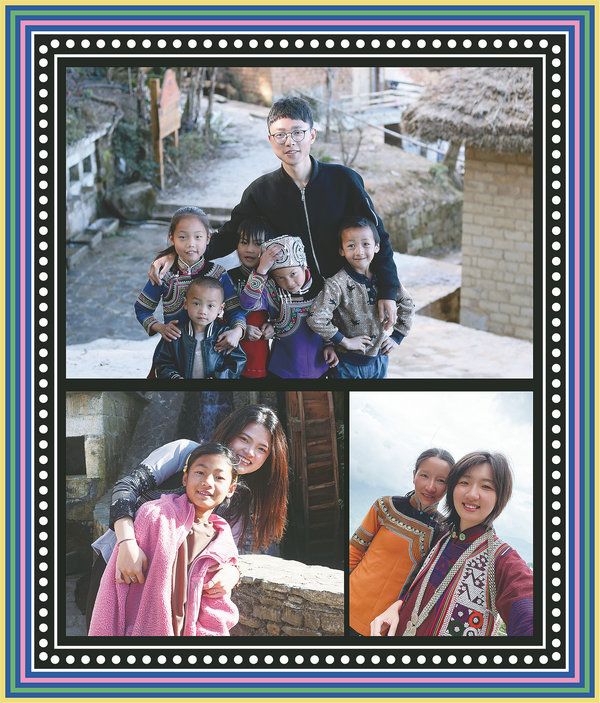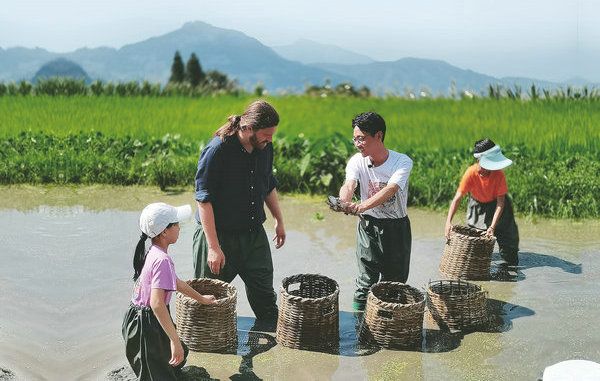Azheke village, located in the Honghe Hani-Yi autonomous prefecture of Yunnan province, is known for its stunning rural scenery. Terraced fields cascade across the landscape, blending harmoniously with traditional Hani "mushroom cottages". In 2024, the United Nations World Tourism Organization recognized Azheke as one of the Best Tourism Villages.
However, before receiving this recognition, Azheke had long struggled with poverty.
In January 2018, Yang Bing, a student from the School of Tourism Management at Sun Yat-sen University (SYSU) in Guangzhou, Guangdong province, visited Azheke and found it in disrepair — houses were crumbling, ditches were filled with trash, and a local restaurant saw hardly any visitors.
Yang was part of a research trip led by his mentor, Professor Bao Jigang. Their field study revealed that Azheke's annual per capita income at the time was only 2,785 yuan ($382.12), classifying it as a poverty-stricken village.
With traditional farming becoming less profitable, many villagers had left to find work elsewhere, putting the terraced fields, traditional homes, and Hani culture at risk of disappearing.
In response, Bao's team launched the Azheke Plan. "Our goal was to apply academic expertise to support the village's tourism development, improving residents' livelihoods while preserving their cultural heritage," he said.
Unlike commercial tourism companies that keep most of the profits, this plan introduced a village collective tourism cooperative, where villagers own 70 percent of the company's shares, while the government holds 30 percent to cover development costs.
Revenue is distributed according to a "4-3-2-1"model: 40 percent goes to villagers preserving traditional homes, 30 percent to those maintaining rice terraces, 20 percent to residents who continue living in the village, and 10 percent to those maintaining household registration.
This system not only provides financial benefits but also encourages residents to stay and actively contribute to preserving the village's natural and cultural heritage.

Yang Bing (center), Yang Hongni (right), and Long Yutong (behind) take photos with local Hani people in Azheke village, located in the Honghe Hani-Yi autonomous prefecture, Yunnan.
A vision takes root
In June 2018, Yang became the first volunteer to reside in Azheke, helping locals implement the plan.
Initially, the villagers were skeptical of this outsider. Even after the village collective company was established, only a few households chose to participate.
But Yang didn't give up. He fully immersed himself in village life, working alongside residents and engaging in their daily routines. "They probably thought I wouldn't last a month," he laughed. To their surprise, Yang was still there eight months later.
In March 2019, the company distributed its first tourism dividends. Seeing tangible financial benefits, the villagers began to recognize Yang's sincerity and dedication. More residents were encouraged to join the effort, further boosting local tourism and cultural preservation.
Yang also revived traditional skills and practices that the villagers had previously taken for granted, turning them into tourism experiences such as fruit-picking, fishing, weaving, and hosting Hani family banquets. Villagers led these activities and shared in the profits, creating a sustainable and vibrant local economy.
"These activities don't require advanced skills, making them accessible for villagers to take on flexible, part-time work," Yang explained.
These initiatives have also created new income sources and attracted villagers working elsewhere to return home during peak tourist seasons.
As tourism flourished, Yang noticed a shift in the villagers' mindset. "Traditional houses were better preserved, and long-forgotten or simplified folk customs were revived," he said. "Villagers began to take greater pride in their Hani heritage."
So far, the company has held 10 dividend distribution ceremonies. Since the first payout in March 2019, all 65 households in the village have collectively received over 2.33 million yuan in dividends, with each household earning an average of more than 35,885 yuan.

Yang Bing (second from right) catches fish with international tourists during a tourism activity in the terraced fields of Azheke.
Looking ahead
As villagers became more involved in the project, Yang transitioned from leading the effort to providing support. By September 2019, after laying the groundwork for the Azheke Plan, he concluded his time in the village.
Since then, the research team has assigned two student volunteers each academic year to help villagers tackle new challenges.
"Even after we leave, we don't just walk away," said Yang Hongni, 33, who stayed in Azheke from August 2021 to June 2022. "We maintain a WeChat group to share ideas and solutions."
For example, villagers were confused by the varying payment rates as more filming teams began visiting. The language barrier was also an issue. "Most villagers over 35 didn't speak Mandarin," Yang Hongni explained. This sometimes led to tourists filming villagers without their consent, disrupting their daily lives.
With the help of the volunteers, the villagers developed a standardized filming policy. It set consistent payment rates for filming companies, listed cultural taboos, and encouraged younger villagers who spoke Mandarin to assist with communication.
The creation of this policy is an example of how the Azheke Plan has moved beyond poverty alleviation and heritage preservation to empower villagers in self-governance.
Under the plan, key management decisions are made through village-wide meetings and formalized as community regulations. These rules are then shared in a public online group to ensure transparency. Additionally, the village tourism company regularly publishes its financial records, allowing everyone to monitor revenue and expenses.
Another notable achievement is the improvement in children's education.
"We organize activities, such as reading sessions, film screenings, and outdoor events for the village children," Yang Hongni said.
The team has also established a village library and introduced an education incentive program that offers financial rewards for academic achievements.
As villagers became more involved in the project, Yang transitioned from leading the effort to providing support. By September 2019, after laying the groundwork for the Azheke Plan, he concluded his time in the village.
Since then, the research team has assigned two student volunteers each academic year to help villagers tackle new challenges.
"Even after we leave, we don't just walk away," said Yang Hongni, 33, who stayed in Azheke from August 2021 to June 2022. "We maintain a WeChat group to share ideas and solutions."
For example, villagers were confused by the varying payment rates as more filming teams began visiting. The language barrier was also an issue. "Most villagers over 35 didn't speak Mandarin," Yang Hongni explained. This sometimes led to tourists filming villagers without their consent, disrupting their daily lives.
With the help of the volunteers, the villagers developed a standardized filming policy. It set consistent payment rates for filming companies, listed cultural taboos, and encouraged younger villagers who spoke Mandarin to assist with communication.
The creation of this policy is an example of how the Azheke Plan has moved beyond poverty alleviation and heritage preservation to empower villagers in self-governance.
Under the plan, key management decisions are made through village-wide meetings and formalized as community regulations. These rules are then shared in a public online group to ensure transparency. Additionally, the village tourism company regularly publishes its financial records, allowing everyone to monitor revenue and expenses.
Another notable achievement is the improvement in children's education.
"We organize activities, such as reading sessions, film screenings, and outdoor events for the village children," Yang Hongni said.
The team has also established a village library and introduced an education incentive program that offers financial rewards for academic achievements.
Planting seeds
Long Yutong, 25, arrived in Azheke in July 2024 and is set to complete her volunteer work in February.
During her stay, she has been exploring how tourism has created job opportunities for local Hani women, contributing to their personal growth.
"Many women are still limited to basic tasks like housekeeping due to their lack of education," Long said. "The village is so isolated and traditional that some men feel uneasy when their wives earn more than they do."
She recalled an incident where a local woman fluent in Mandarin was offered a position at the tourism company. Her husband objected to her taking a public-facing role, and she ultimately had to decline the opportunity.
Even with these challenges, Long observed that as the local economy improved and villagers gained more exposure to the outside world, many women began to develop a stronger sense of independence.
She remembered a woman with the surname Wu, who, despite having no formal education, was full of ideas and actively managed her own business as tourism in the village expanded. Over time, Wu became more confident and outgoing in her interactions with visitors.
"I want to earn my own money so my children can receive a better education," she told Long.
Long also noticed a subtle yet significant shift in how Wu identified herself. Traditionally, local women are often addressed as "Asao" (sister-in-law), a term tied to their marital status. However, Wu rejected this label, as she didn't want to be defined by her relationship to a man.
"Although the local culture remains traditional, seeing these women embrace more modern perspectives makes me feel that real change is happening here," Long said.
The Azheke Plan has become a successful model and is now being introduced in various villages across Yunnan, Xinjiang, and other regions.
Although adapting it to different areas presents new challenges, Yang Bing, currently a postdoctoral researcher at SYSU, remains dedicated to both research and practical application.
"Azheke is more than just a case study for my research paper — it has shaped my perspective on tourism and poverty alleviation, inspiring me to focus on practical solutions," he said.
Link to the report: https://www.chinadaily.com.cn/a/202502/19/WS67b50723a310c240449d5f42_1.html
